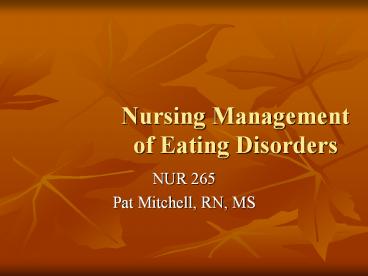Nursing Management of Eating Disorders - PowerPoint PPT Presentation
1 / 27
Title:
Nursing Management of Eating Disorders
Description:
Feelings produce harsh self-judgment focused on weight. Eating Disorders: Theories ... Perfectionism. Obsessive thoughts and actions relating to food. Need to control ... – PowerPoint PPT presentation
Number of Views:3678
Avg rating:3.0/5.0
Title: Nursing Management of Eating Disorders
1
Nursing Management of Eating Disorders
- NUR 265
- Pat Mitchell, RN, MS
2
Eating Disorders
- Anorexia nervosa
- Bulimia nervosa
- Eating disorder not otherwise specified (NOS)
- Binge eating disorder
3
Eating Disorders Theories
- Separate syndromes based on a cluster of
symptoms - Neurobiological
- Altered neurotransmitters
- Neuroendocrine
- Abnormalities noted
- Causal relationship possible
- May be result of starvation or abnormal eating
behavior
4
Eating Disorders TheoriesContinued
- Psychological models
- Core psychopathology
- Feelings of
- Low self esteem
- Self-doubts about personal worth
- Feelings produce harsh self-judgment focused on
weight
5
Eating Disorders TheoriesContinued
- Sociocultural models
- Incidence of eating disorders increases in
societies in which women have a choice in social
roles - Genetic models
- Strong genetic link for eating disorders
6
Eating Disorder Cycle
7
Signs and Symptoms and Clinical Presentations of
Anorexia and Bulimia
- Anorexia nervosa (Table 17-1)
- Bulimia nervosa (Table 17-1)
8
Anorexia Nervosa
- Physical Symptoms
- Weight loss 15 below ideal
- Amenorrhea
- Bradycardia, subnormal T
- Cachexia, sunken eyes, dry skin
- Lanugo on face
- Constipation
- Cold sensitivity
9
Anorexia Nervosa
- Behavioral Symptoms
- Self-starvation
- Compulsive behaviors regarding food
- May use laxatives or diuretics, excessive
exercise, vomiting - Wearing baggy clothes
10
Anorexia Nervosa
- Psychologic Symptoms
- Denial of seriousness of low weight
- Body image disturbance
- Irrational fear of weight gain
- Constant striving for perfect body
- Self-concept unduly influenced by shape and
weight - Preoccupation with food, cooking
- Delayed psychosexual development
- Little interest in sex, relationships
11
Bulimia Nervosa
- Physical Symptoms
- Electrolyte imbalances
- Hypokalemia
- Alkalosis
- Dehydration
- Idiopathic edema
- Cardiovascular
- Hypotension
- Dysrhythmias
- Cardiomyopathy
12
Bulimia Nervosa
- Physical Symptoms, contd.
- Endocrine
- Hypoglycemia
- Menstrual dysfunction
- Gastrointestinal
- Constipation, diarrhea
- Gastroparesis
- Esophageal reflux
- Esophagitis
- Esophageal tears
13
Bulimia Nervosa
- Physical Symptoms, contd.
- Dental
- Enamel erosion
- Parotid Gland Enlargement
14
Bulimia Nervosa
- Behavioral Symptoms
- Recurrent episode of binge eating
- Purging behavior to compensate
- Self-induced vomiting, use of laxatives,
diuretics, enemas, fasting, excessive exercise
15
Bulimia Nervosa
- Psychologic Symptoms
- Body image disturbance
- Persistent over concern with weight, shape,
proportions - Mood swings, irritability
- Self-concept unduly influenced by weight
16
Medical Complications of Anorexia and Bulimia
Nervosa
- Medical complications are listed in Box 17-1
17
Therapeutic Relationship Building Trust and
Having Empathy
- Client with anorexia nervosa
- Perfectionism
- Obsessive thoughts and actions relating to food
- Need to control
18
Anorexia Nervosa Nursing Process
- Assessment
- Nursing diagnosis
- Outcome criteria
- Short-term
- Long-term
- Planning
- Refeeding syndrome
19
Anorexia Nervosa Intervention
- Acute phase/basic level intervention
- Milieu therapy
- Precise meal times and menus
- Observation during and after meals
- Regularly scheduled weighing
- Counseling
- Cognitive distortions
- Health teaching
- Self-care
20
Anorexia Nervosa Intervention Continued
- Long-term treatment/advanced practice
interventions - Psychotherapy
- Psychopharmacology
- Fluoxetine (Prozac)
- Olanzapine (Zyprexa)
21
Anorexia Nervosa Evaluation
- If weight falls below the goal, treatment is
changed
22
Therapeutic Relationship Building Trust and
Having Empathy
- Client with bulimia nervosa
- Sensitive to perceptions of others
- May feel
- Shame
- Out of control
- Low self-esteem
- Unworthiness
- Dysphoria
23
Bulimia Nervosa Nursing Process
- Assessment
- Nursing diagnosis
- Outcome criteria
- Short-term
- Long-term
- Planning
24
Bulimia Nervosa Intervention
- Acute phase/basic level intervention
- Milieu therapy
- Interrupt binge-purge cycle
- Prevent disordered eating behaviors
- Counseling
- Health teaching
- Long-term treatment/advanced practice
interventions - Psychotherapy
- Cognitive-behavioral
- Psychopharmacology
- Fluoxetine (Prozac)
25
Bulimia Nervosa Evaluation
- Normalize eating pattern
- Maintain regular exercise plan
- Weight in normal range for height
26
Binge Eating Disorder
- A variant of compulsive overeating
- Reported in 20 to 30 of obese clients
- No compensatory behaviors
- Major depression a significant comorbidity
- Most effective treatment is cognitive-behavioral
therapy - Selective serotonin reuptake inhibitors used in
treatment
27
Binge Eating Disorder
- A variant of compulsive overeating
- Reported in 20 to 30 of obese clients
- No compensatory behaviors
- Major depression a significant comorbidity
- Most effective treatment is cognitive-behavioral
therapy - Selective serotonin reuptake inhibitors used in
treatment































